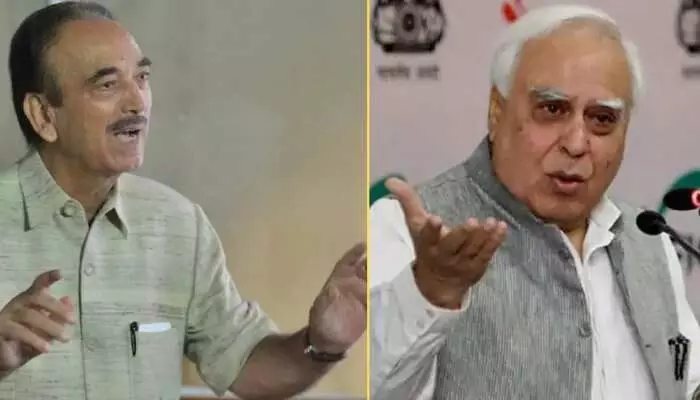
Disgruntled dissidents and future of Congress
text_fieldsFile photos of senior Congress leaders Ghulam Nabi Azad and Kapil Sibal
It is neither inconceivable nor unseemly in a democracy, for the leader of an opposition party to praise the prime minister. Nor is it imperative in a democracy to deride every move by the ruling party or to criticise everything done by the rulers. Even with ample room for this principle, one cannot help finding it strange and unusual that one of the top leaders of Indian National Congress, Ghulam Nabi Azad, an eminent parliamentarian who represented the party in both houses for 40 years, heaped praise on prime minister Narendra Modi at a public programme in Jammu. This came a few days after Azad having received lavish praise from Modi while the former retired from Rajya Sabha. This was especially so, in the context of the 'Group of 23' dissidents in the Congress leadership having met in Jammu and expressed disapproval of the way the party has been functioning. What Azad said about Modi was that he liked him as one who did not conceal his real identity. His comment was about Narendra Modi's claim of having worked in a tea shop - which he used to state openly with pride.
Let alone the fact that the man who had to play the role of a poor tea maker, is known the world over not as a champion of the millions of poor and common people, but as the darling of the Adani-Ambani class. In perspective, there is the fact that Ghulam Nabi Azad and the others who joined hands with him including Kapil Sibal, Anand Sharma, Manish Tiwari, Raj Babbar and former Haryana chief minister Bhupinder Singh Hooda were a team that had written to the Congress president Sonia Gandhi last year emphasising the need to move under a new leadership through an overhaul. After Rahul Gandhi resigned from party leadership following the party's unprecedented setback in the Lok Sabha election, the ailing Sonia Gandhi was left with no option but to assume party presidency again. The party rank and file, in fact the secular bloc of the country, were hoping that the change was only temporary and soon Rahul Gandhi himself would assume leadership. But niether his mother Sonia nor his sister Priyanka were apparently ready to force Rahul out of his stubbornness not to take up the presidency for any reason.
On the other hand, even in states where the Congress won majority and came to power, the picture that followed was of BJP poaching legislators with abandon, by offering money, posts and threats and by winning overnight defections to overthrow ministries with inglorious success. The Congress party and the country as a whole were left helpless spectators to this phenomenon. Most believed that had there been a strong and bold Congress leadership at the national level, this would not have been the case. It was in this context that 23 top-ranking leaders jointly wrote a letter to Sonia Gandhi, but the latter could not take its content at face value - perhaps with good reason. Even then, after the Congress Working Committee meeting at which the disagreements were more or less patched up, it was expected that the situation would improve and the party would be able to rise to the occasion. Unfortunately, not only was any change not visible, even when circumstances emerged favourable for an opposition line-up to defeat the BJP alliance in Bihar assembly election, it was the weakness and listlessness of the Congress that offered a golden opportunity for the BJP alliance. More recently, only a few days ago the BJP shamelessly manipulated the overthrow of the Congress government in Puducherry with no one to account for it.
The stances of the 'dissident' group who met in Jammu, are to be viewed in this perspective. It is either that many including Ghulam Nabi are preparing to flock to the BJP, or that they are attempting to repeat history by splitting the Congress. A normal political observer may read such a denouement into the unfolding events. In either case, the new turn of events will be too much for the secular democratic India to bear. The realisation of the saffron dream of a Congress-free India will only mark the end of a secular democratic India. For, in the words of Kapil Sibal however weak the Congress may be, currently there is no other secular alternative to rise in the country. The left is at its weakest phase in the country's history. Although in West Bengal the left-Congress alliance has entered the fray for their own survival, even their best well-wishers would not be optimistic of their ability to beat both Trinamool Congress and the BJP in one go. And in Kerala, even if the left front wins a majority to continue in power, that will not have any major impact at the national level.


















